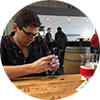Some of our Fervent Few members recently decided to create a Slack channel for people studying to take the Cicerone exams. It got us thinking about beer education in general. Most of us might not necessarily take a Cicerone exam, but how are we expanding our beer knowledge—classes, books, homebrewing? So this week, we asked the Fervent Few what they’re doing to become smarter about their favorite beverage.

Zack Rothman: “I love beer books. I’ve built up a little library over time, but I have to say my favorite has been The Beer Bible by Jeff Alworth. It’s not only a great source of knowledge, but a useful reference whenever curiosity strikes. It’s a book that helps both newcomers and veterans learn more about beer, and it’s impressively comprehensive. It has a wealth of information on each beer style and its history, plus it’s got nifty infographics. Everybody loves infographics.”

Quinton Cook: “My journey to truly understand beer still has a hell of a long way to go. However, my library is coming together quite nicely to help me on that journey. I certainly have some go-to options, though, including both volumes of Randy Mosher’s Tasting Beer and The Oxford Companion to Beer by Garrett Oliver. It’s a tremendous resource for all of your beer questions.”

Jaron Wright: “Homebrew. If you really want to learn what goes into beer and how ingredients and process change flavor, the best way is to join someone doing it and taste results.”

Tim Coe: “As someone working prominently on the business and administration side of the industry, I'm keenly aware that my own beer knowledge is limited and spotty. That said, the greatest resource I've had is brewers, both professional and amateur, who are always happy to explain something esoteric about the history of yeast cultivation or style definition or anything else. One of the big reasons I fell in love with beer is the community of people surrounding it who are excited about their expertise and about where their own knowledge limitations lie.”

Dom Cook: “Homebrew, ask pro brewers questions (if you can), study for the BJCP, Tasting Beer, Radical Brewing, Oxford Companion, the malt, yeast, water, hops series, material from the BA, YouTube, tasting as much beer as you can to study, not to drink. Sign up for competitions to steward, purchase off flavor tasting kits, and do sessions yourself. Listen to others. You never stop learning, though—it’s a lifelong process.”

John Conner: “I first became interested in craft in 2009 when my brother and I stopped in Asheville before a whitewater rafting trip and happened to go Barley's Taproom by accident. Over the years, I feel my like my knowledge has expanded, and what helped me has been two main things: reading and tasting. In terms of reading, Randy Mosher's Tasting Beer was an early read that helped me to understand styles. And sites like Good Beer Hunting and CraftBeer.com provided a chance to learn about breweries, trends in the industry, etc. I also have subscribed in the past to magazines like Draft and BeerAdvocate as well. In terms of tasting, I did a lot of flights in my early days of drinking craft beer, visiting every brewery and craft beer bar I could, and I also went to Total Wine a lot during that time to buy single beers of various styles. As my palate has evolved, I've definitely become more selective in terms of which breweries I'll visit and which bars I go to, but I think some of those early experiences helped me to figure out which styles I liked and didn't liked, as well as helping me detect quality beer.”

Brad: “I think blind tasting and BS-ing my way through those tastings until I've improved my palate is the route I'm going to use to improve my knowledge of beer. As a companion to that, I have brought out the Cicerone Flavor Map to act as a beginning framework for what potential flavors could be present in the beer. Though I do not want to go down the full Cicerone course, (I don't work in the industry and don't think there will be a tangible benefit I couldn't achieve outside of the course), I will likely attend some local courses on off-flavors to further improve my tasting ability.”

Bryan Arndt: “I'm not sure if I'll ever go the Cicerone route, but learning to homebrew has been absolutely essential in furthering my knowledge of brewing—especially when it comes to styles and processes. Along with that, a number of books have helped me significantly along the way: Charlie P's books, American Sour Beers by Michael Tonsmeire, and Water by Palmer/Kaminski immediately come to mind.”

Steve Rimington: “My knowledge came on in leaps and bounds a year or two into my journey when I found a bottle shop (run by BrewDog) that regularly ran tasting events. The beer was always accompanied by pairings. It got to the point where I was enjoying it and learning so much I was going three weeks out of four. Events were varied between style, brewery, or geographical location. Friendships made then transitioned into supported learning through bottle shares or joint trips to other events. Work enabled me to travel so I always made an effort to find local breweries and beers. Learning through thoughtful experience. I worry that, should I ever take the Cicerone, I may find a very enjoyable hobby turned into something more academic and less pleasurable.”

There’s lots of great info here for people who want to increase their beer knowledge, but what if you are planning on taking a Cicerone exam? Here’s some advice from people who are either actively studying or have taken one of the tests.

Quinton Cook: “As I prep to take the Cicerone exam this July, one of my current focuses is food and beer pairing. Recently picked up Oliver’s The Brewmaster’s Table. Excited to dive in.”

Bill Kuhn: “As I was preparing for the certified as well as the advanced exam, I would go to bars that offered flights. I’d chat with the bartender for a bit, letting them know I was studying for the exam. Then I’d have them pour me a blind flight. From there, I’d go through a full assessment of the beers noting any off flavors or flavors that stood out. After tasting my way through the full flight, I’d write down my guess on the styles of each brew and then have the bartender tell me what each beer was. This was particularly useful for the ‘Is it style A or style B?’ section. The only difficulty I ran into was bars not carrying a diverse draft list or having a beer in the set that was a fruited or hybrid style. Overall, a helpful exercise.”

Russ Clarke: “When I worked for BrewDog, it was actively encouraged to progress with the Cicerone program. They say that every role in the business benefits from more beer education. It helps that I was passionate about beer in the first place, hence wanting to work for them! Regardless, passing level two wasn't a walk in the park. I co-wrote a study guide for both Beer Server and Cicerone with a few others whilst at BD. Passing before these were written though was a huge amount of effort. [I’ve also used] the Aroxa tasting kits for off-flavors, and read the core books: Randy Mosher's Tasting Beer, Garrett Oliver’s Brewmaster's Table.”

Nick Naretto: “The first booze book that I read was a book on bourbon, and it opened the door to reading a ton of beer books. After years of reading just about anything I could find about beer, I decided that I wanted to take Cicerone’s Level 1: Certified Beer Server exam for myself, and it might come in handy at some point in my career. The only additional research that I did before taking the exam was looking up some draft beer guidelines because I’ve never really worked with it. I passed on my first try and have been wondering if I should try and go for the next level. The first beer book I ever read was Tasting Beer by Randy Mosher, which most people will tell you to read first. I’m going to go against the grain and say that someone new should save that book until they are a book or two deep in their journey. The book that really got me hooked was The Complete Beer Course by Joshua M. Bernstein. I’ve learned a decent amount about beer without any formal training or classes. All you have to do is dedicate yourself by reading, tasting, listening, brewing, writing, photographing all things beer, and you’ll learn a lot.”

Jason Berg: “A friend helped get me into beer when we decided to figure out how to homebrew together nine years ago, and I have come a long way through that with many books, podcasts, and forums to light the way. Recently, I have been making a move toward a more formal learning process toward certification on the BJCP and Cicerone paths. My main sources of learning have been books for formal process and education (How To Brew by Palmer, Tasting Beer by Mosher), industry interview podcasts for professional insight (Good Beer Hunting, Steal This Beer), brewing podcasts for detail on steps in the process (BeerSmith, Brülosophy), brewing culture podcasts for news and changes in products and the environment (Beervana, Minnesota Beercast), and websites/forums for specific discussion (Brulosophy.com, Homebrewing.Reddit.com). I have tried to keep my sources varied, and recently, I am trying to cross-reference all those ideas and knowledge toward specific BJCP and Cicerone certifications. I cannot imagine trying to learn this without hands-on brewing experience, being involved in homebrew clubs, and events at local breweries to see how the pieces come together.”

Are you working towards a beer certification or interested in sharing your experiences doing so? You should join us in the Fervent Few! Our Cicerone study channel on Slack is already full of helpful, friendly conversations. It would be great to see what tips you have for us.










